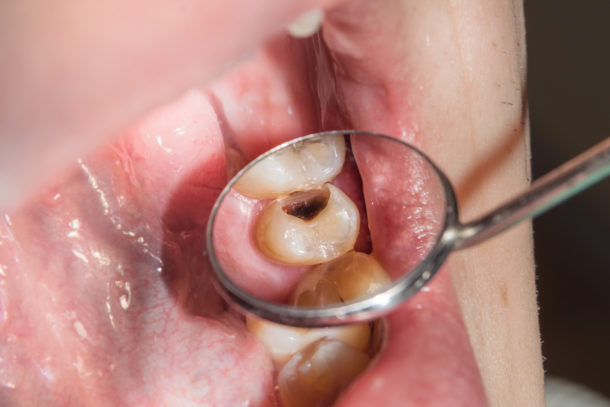It is estimated that approximately 91% of Americans over the age of 20 have experienced a cavity at some point. Furthermore, nearly 30% of Americans over 20 have untreated cavities. These numbers are astonishing considering that preventive care can help avoid cavities. So, why do cavities start?

Enamel is the Strongest Substance
The outer layer of a tooth is covered in enamel. Enamel is the strongest substance in the human body; however, it can be eroded with acid. The cavity-causing bacteria in our mouths feed on sugar. Eating sugary foods feeds these bacteria and as a result, they produce acid.
The cavity-causing bacteria in our mouths feed on sugar. Eating sugary foods feeds these bacteria and as a result, they produce acid. Over time the acid in your mouth wears away the enamel and begins to create a cavity. This is why it is so important to remove as much plaque as possible each day to get rid of any acid sitting on your teeth. There are many other factors that also contribute to the risk of developing cavities. These include but are not limited to:
- A high sugar diet
- Poor home care
- Xerostomia (dry mouth)
- Low exposure to fluoride
- Frequent snacking
- GERD
- History of cavities
- Eating disorders
- Lack of dental care
Demineralization
Demineralization is the first thing that will start to happen as a cavity begins forming. This creates a hyper-white and chalky or brown appearance. At this stage, before a true cavity is formed, the enamel can be remineralized with increased fluoride and good homecare. Once the cavity progresses through the enamel and into the softer layer of tooth (Dentin) it cannot be reversed.
Once this happens the cavity will grow much quicker. If left untreated with dental care the decay will eventually reach the pulp chamber of the tooth. The pulp chamber is where the nerve and blood vessels of the teeth are.
If the decay enters into the pulp, the nerve will become infected, and a root canal is required to save the tooth. After a root canal your tooth will become more brittle and a crown is indicated to provide strength and to prevent it from fracturing.
Chances are you’ve had a cavity or two filled in your life. By identifying your risk factors with your dentist and hygienist we can find a plan to prevent future cavities. If you start to see or feel any signs of a cavity please call us! The sooner we can treat a cavity the better the prognosis and we can then determine what steps can be taken to prevent new cavities from developing.

References
Mouth Healthy – https://www.mouthhealthy.org/en/dental-care-concerns/how-do-we-prevent-cavities
National Institute of Dental and Craniofacial Research – https://www.nidcr.nih.gov/health-info/tooth-decay/more-info/tooth-decay-process

At Eleven Eleven Dental, we believe your comfort should always come first. You will feel our warmth and compassion as soon as you walk through our doors.